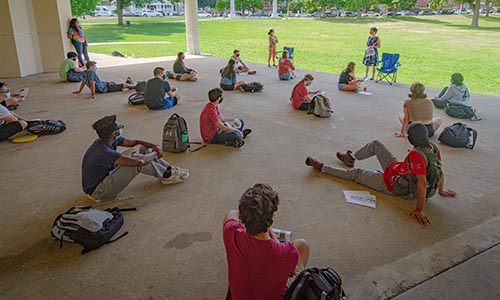Great Problems Seminar Presentation Week
March 2021
Welcome to the Great Problems Seminars Presentation Page
While we will miss our annual poster session, we are excited to see, and to have you see, the work of our first-year students in these courses. This year the students and faculty overcame the challenges of social distancing, group and class meetings via Zoom, the stresses and strains of the pandemic, elections, and social unrest while working on their ideas to ameliorate some of the world’s great global challenges. I could not be prouder of this group. Kris Wobbe, Director, Great Problems Seminar
Expand the classes below to view presentation times and Zoom links
People's Choice Award
Each class has a Padlet with postings of supporting materials to accompany their live presentation. Under each post there is a "heart." To submit a presentation as your vote for People's Choice, please click on the heart for the presentation of your choice. Please only vote for one presentation.
Climate Change
Thursday, March 11, 2021, 11am - 12:50pm
| 1 | Small Scale Carbon Capture Utilization and Implementation |
| 2 | Rigged for Oil Rigs |
| 3 | Destigmatizing Nuclear Energy to Decarbonize the Worlds' Power Supply |
| 4 | Climate Change Impacts on Native Hawaiian Population |
Humanitarian Engineering
Wednesday, March 17, 2021, 3:15pm - 4:50pm
| 5 | The Jerusalem Water Relief Project |
| 6 | Agricultural Sustainability through the Use of Recaptured Water |
| 7 | Thinking Outside the Well: Addressing Water Scarcity in Rural Morocco |
Ignorance is Not Bliss: Can Schools and Technology Help?
Thursday, March 11, 2021, 1pm - 1:50pm
| 8 | The Social Engagement of College Students during Covid |
| 9 | Mentoring to Increase Sixth Graders' Technological Literacy |
Power the World
Thursday, March 18, 2021, 10am - 11:50am
| 10 | Mechanical Energy Storage |
| 11 | Pumped Hydropower |
| 12 | Biofuels in Public Transportaion |
| 13 | WPI Nuclear Sustainability |

COVID Presents a Learning Opportunity for Great Problems Seminar Course
In A- and B-Terms, the Heal the World course, taught by professors Lisa Stoddard and Reeta Rao, had 50 students working in teams of three or four, examining case communities from around the world, looking at global health issues and the biological and social causes and implications of each. In B-term, the students are taking what they have learned through their activities in A-Term and using it to solve a health-related problem of their choosing.